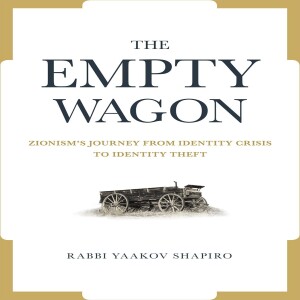
Parallax Views w/ J.G. Michael
Society & Culture

The Empty Wagon: Zionism’s Journey from Identity Crisis to Identity Theft w/ Rabbi Yaakov Shapiro
 2023-01-21
2023-01-21
On this edition of Parallax Views, scholar, international speaker, and Orthodox Jewish Rabbi Yaakov Shapiro, host of the Committing High Reason podcast, joins us to discuss his book The Empty Wagon: Zionism's Journey from Identity Crisis to Identity. Rabbi Shapiro is an opponent of Zionism from an Orthodox Jewish perspective. From his purview, Zionism represents a hijacking of Jewish identity or, as he puts it, a theft of the that identity that is not in line with his religion.
The conversation begins with Rabbi Shapiro explaining the Orthodox perspective on Judaism. In this regards he discusses the Torah, the seven Noahide Laws, fulfilling religious commandments, and what the Jewish people are definitionally from the perspective of an Orthodox Jew. He explains that from an Orthodox point of view the Jewish people are defined by their religion rather than national characteristics or other traits. Orthodox Jews, he argues, wish to be allowed to practice their faith and be left to their devices doing that.
This leads us into a discussion the Orthodox Jewish opposition to Zionism, or, from Rabbi Shapiro's perspective, the Zionist opposition to Orthodox Judaism. We delve into the history of friction between Orthodox Judaism and Zionism as well as how the history of antisemitism, in both it's religiously-driven and racially-driven forms including pogroms and the Dreyfuss affair, plays into this story. In regards to all this we also discuss the idea of strength in Jewish thought, the era of nationalism and the birth of Zionism, Bolshevism and Communism, Hitler and the Holocaust, assimilationism and Zionism, Theodor Herzl, the Jewish language, Rabbi Shapiro's view that Zionism created a synthetic history of the Jewish people, and the success of Zionism in the 20th century.
As the conversation goes deeper we discuss:
- Israel as the Holy Land rather than a temporal, secular nation-state; the Holy Land is holy regardless of who has political control of it
- The Messianic Age; the Orthodox idea that the state of Israel is not allowed to exist as a Jewish state before the coming of the Messiah; Rabbi Shapiro's argues that opposition to Zionism is not simply about the Messianic Age and that the difference between Zionists and Orthodox Jews on Israel is an obfuscation and that the difference goes beyond the question of the Messianic Age
- Israel as the Jewish state or the nation-state that represents all Jews; why Rabbi Shapiro takes issue with this and the logic of it
- The Jonathan Pollard spying case; the "dual loyalties" trope that has been used against Jews, Japanese-Americans in WWII, and Italian Catholics in the era of JFK; Pollard's claim that all Jews have dual loyalties whether they realize it or not; how that particular claim by Pollard bolsters antisemitism
- Zionism, violence in the Israel-Palestine conflict, and antisemitism
- Rabbi Shapiro's responds to the argument that the creation of the Israel was necessary to prevent future pogroms and horrors like the Holocaust; the ideology of Zionism vs. the idea that Zionism is just a safe haven for Jews from gentile violence
- The traditionally anti-Zionist Haredim Jews who live in Israel; the cultural tensions between the Haredi and other Israeli citizens; Itamar Ben-Gvir, Bezalel Smotrich, and the Religious Zionism coalition; why do some Orthodox Jews support Israel or live within it if they claim to oppose it?
- The argument that anti-Zionism is the new antisemitism; the idea that anti-Zionism is antisemitic as itself a form of antisemitism; the Israel-Palestine conflict as being a question for Zionists rather than Jews
- And more!
More Episodes
Create your
podcast in
minutes
- Full-featured podcast site
- Unlimited storage and bandwidth
- Comprehensive podcast stats
- Distribute to Apple Podcasts, Spotify, and more
- Make money with your podcast
It is Free
- Privacy Policy
- Cookie Policy
- Terms of Use
- Consent Preferences
- Copyright © 2015-2024 Podbean.com





